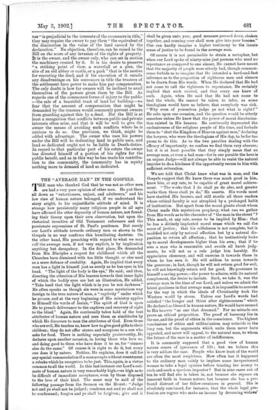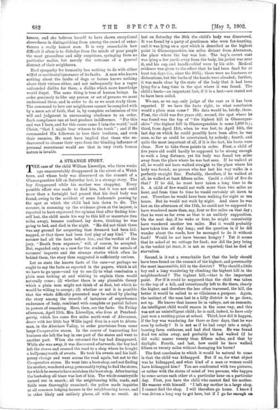THE "AVERAGE MAN" IN THE GOSPELS. T HE man who thanked
God that he was not as other men are had a very poor opinion of other men. He put them all down as "extortioners, unjust, and adulterers," and his low view of human nature belonged, if we understand the story aright, to his unjustifiable attitude of mind. It is strange how persistently many religious people in all ages have affirmed the utter depravity of human nature, not found- ing their theory upon their own observation, but upon the rhetorical invective of Old Testament reformers and the passionate expressions of St. Paul's penitence. But surely our Lord's attitude towards ordinary men as shown in the Gospels in no way confirms this humiliating doctrine. On the other hand, His preaching with regard to what we may call the average man, if not very explicit, is by implication anything but derogatory. In the first place, He demanded from His Disciples a respect for childhood which all the Churches have dismissed with too little thought or else used as a mere defence of credulity. Again. He implied that every man has a light in himself just as surely as he has eyes in his head. "The light of the body is the eye," He said; and then, directing the attention of His hearers towards that inner light of which the bodily eyes are but an illustration, He added, "Take heed that the light which is in you be not darkness." He often speaks as though sin were in some mysterious way foreign to the true nature of man, a " captivity " under which he groans, and at the very beginning of His ministry applies to Himself the words of Isaiah, "The spirit of God is upon Me to preach deliverance to the captives and recovery of sight to the blind." Again, He continually takes bold of the best attributes of human nature and uses them as similitudes by which He discovers to man the attributes of God. Even those who are evil, He teaches us, know how to give good gifts to their children; they do not offer stones and scorpions to a son who asks for food. There is nothing especially praiseworthy, He declares upon another occasion, in loving those who love us, and doing good to them who have done it to us, for "sinners also do the same." Of course it is right to do it, but every one does it by nature. Neither, He explains, does it call for any special commendation if a man accepts without resentment a rebuke which he recognises to be just. This, again, is a virtue common to all the world. In this last instance our Lord's esti- mate of human nature is very remarkably high,—so high as to be difficult of immediate acceptance, even by those disposed to the love of their kind. The same may be said of the following passage from the Sermon on the Mount : "Judge not and ye shall not be judged; condemn not and ye shall not be condemned; forgive and ye shall be forgiven; give and it shall be given unto you ; good measure pressed down, shaken together, and running over shall men give into your bosoms." One can hardly imagine a higher testimony to the innate sense of justice to be found in the average man.
Of course it is not permissible to strain a metaphor, but when our Lord spoke of ninety-nine just persons who need no repentance as compared to one sinner, He cannot have meant that the majority of people were utterly bad, though common- sense forbids us to imagine that He intended a hard-and-fast inference as to the proportion of righteous men and sinners to be drawn from His words. When He declared that He had not come to call the righteous to repentance, He certainly implied that such existed, and that every one knew of such. Again, when He said that He had not come to heal the whole, He cannot be taken to infer, as some theologians would have us believe, that everybody was sick. "Why even of yourselves judge ye not what is right ? " He asks upon one occasion, and the question would be utterly senseless unless He knew that the power of moral discrimina- tion existed in His hearers. He continually deprecated the exclusiveness of the religious people of His time, and forbade them to "shut the Kingdom of Heaven against men," declaring the lawyers, who were the theologians of His day, to be far too prone to do this. As to the two parables dealing with the efficacy of importunity, we confess we find them very obscure; but it is at least possible that they simply mean that an average man, or even a bad man—for in one parable the hero is an unjust Judge—will not always be able to resist the natural impulse to do a kindness if the opportunity recurs to him with sufficient reiteration.
We are told that Christ knew what was in man, and the Gospels suggest that He knew there was much good in him, knew him, at any rate, to be capable of great moral achieve- ment. "The works that I do shall ye do also, and greater works than these shall ye do," He asserts. His words must have startled His hearers, and still startle all those readers whose critical faculty is not atrophied by a prolonged habit of inattention. But apart from the moral giants about whom Christ made this mysterious prophecy, what can we gather from His words as to the character of "the man in the street " ? This much, at any rate, seems to be implied by Him • that be has a divinely implanted moral sense which we call the sense of justice ; that his selfishness is not complete, but is modified not only by natural affection but by a natural dis- position to return all affection ; that be instinctively looks up to moral developments higher than his own ; that if he sees a man who is reasonable and avoids all harsh judg- ments, be will not as a rule judge him harshly. He appreciates clemency, and will exercise it towards those in whom he has seen it. He will seldom be mean towards the generous ; in fact, though he will not return good for evil, he will not knowingly return evil for good. He possesses in himself a saving power,—the power to admire, with its natural complement, the desire to imitate. Such, we take it, was the average man in the time of our Lord, and unless we admit the latent goodness in that average man, it is impossible to account for the way in which the ideals of Christianity took the Western world by storm. Unless our Lord's words had satisfied "the hunger and thirst after righteousness" which He declared so blessed in human nature, He would have seemed to His bearers "as one that dreamed." For no miracle can prove an ethical proposition. The proof of harmony lies in the ear, and the proof of ethics in the conscience. The highest conclusions of ethics and utilitarianism may coincide in the long run, but the arguments which unite them never have appealed, and never will appeal, to the natural man, to whom the future of the race is a matter of indifference.
It is commonly supposed that a good view of human nature comes of ignorance of life ; but we believe this is very seldom the case. People who know least of the world are often the most suspicious. How often has it happened to the ordinary man vainly to implore some inexperienced woman to take a legal opinion before trusting her money to such-and-such a specious impostor ? But in nine cases out of ten he will find she is taken in, not because she reposes an innocent faith in human nature, but because she has a pro- found distrust of her fellow-creatures in general. She is absolutely convinced, for instance, that the whole legal pro- fession are rogues who make an income by devouring widows'
houses, and she believes herself to have shown exceptional shrewdness in distinguishing from among the crowd of extor- tioners a really honest man. It is very remarkable how difficult it often is to dislodge from the minds of poor people the most groundless and silly suspicions, springing from no particular malice, but merely the outcome of a general distrust of their neighbours.
Real sympathy for humanity has nothing to do with either wilful or accidental ignorance of its faults. A man who knows nothing about the faults of dogs or horses knows nothing about their virtues either, and not unfrequently has a vague unfounded dislike for them, a dislike which more knowledge would dispel. The same thing is true of human beings. In order genuinely to like any person or set of persons we must understand them, and in order to do so we must study them. The command to love our neighbours cannot be complied with by a mere act of faith, that is, by complete submission of the will and judgment in unreasoning obedience to an order. Such compliance can at best produce indifference. "For this end was I born, and for this cause came I into the world," said Christ, "that I might bear witness to the truth " ; and if He commanded His followers to love their brethren, and even their enemies, He must have implied that those who en- deavoured to cleanse their eyes from the blinding influence of personal resentment would see that in very truth human nature is lovable.











































 Previous page
Previous page